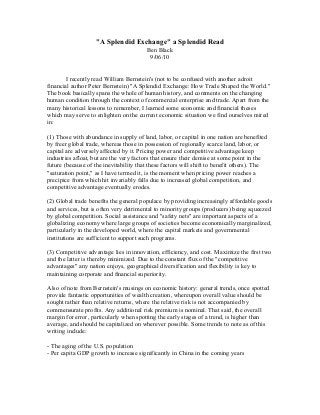
A Splendid Exchange
- 1. "A Splendid Exchange" a Splendid Read Ben Black 9/06/10 I recently read William Bernstein's (not to be confused with another adroit financial author Peter Bernstein) "A Splendid Exchange: How Trade Shaped the World." The book basically spans the whole of human history, and comments on the changing human condition through the context of commercial enterprise and trade. Apart from the many historical lessons to remember, I learned some economic and financial theses which may serve to enlighten on the current economic situation we find ourselves mired in: (1) Those with abundance in supply of land, labor, or capital in one nation are benefited by freer global trade, whereas those in possession of regionally scarce land, labor, or capital are adversely affected by it. Pricing power and competitive advantage keep industries afloat, but are the very factors that ensure their demise at some point in the future (because of the inevitability that these factors will shift to benefit others). The "saturation point," as I have termed it, is the moment when pricing power reaches a precipice from which hit invariably falls due to increased global competition, and competitive advantage eventually erodes. (2) Global trade benefits the general populace by providing increasingly affordable goods and services, but is often very detrimental to minority groups (producers) being squeezed by global competition. Social assistance and "safety nets" are important aspects of a globalizing economy where large groups of societies become economically marginalized, particularly in the developed world, where the capital markets and governmental institutions are sufficient to support such programs. (3) Competitive advantage lies in innovation, efficiency, and cost. Maximize the first two and the latter is thereby minimized. Due to the constant flux of the "competitive advantages" any nation enjoys, geographical diversification and flexibility is key to maintaining corporate and financial superiority. Also of note from Bernstein's musings on economic history: general trends, once spotted provide fantastic opportunities of wealth creation, whereupon overall value should be sought rather than relative returns, where the relative risk is not accompanied by commensurate profits. Any additional risk premium is nominal. That said, the overall margin for error, particularly when spotting the early stages of a trend, is higher than average, and should be capitalized on wherever possible. Some trends to note as of this writing include: - The aging of the U.S. population - Per capita GDP growth to increase significantly in China in the coming years
- 2. - Overall GDP to continue growing at an accelerated rate in Latin America, particularly Brazil, though most likely Mexico and Panama as well (the latter due largely to the widening of the canal). - Market-share of trade and corporate capitalization to diminish for the U.S. indefinitely, due mainly to slower growth rates domestically, combined with the spike in GDP growth for emerging markets, fostered by lower trade barriers, technological advances, and burgeoning capital markets. - The U.S. economy is becoming increasingly service-oriented, and the disparity between income-levels is widening. The class divergence is growing which must be accompanied by a growing safety net to protect the economically disenfranchised from financial calamity. This is necessary to preserve the integrity and strength of the nation and "keep the peace" domestically. Our relative power and dominance of the political and economic forces shaping modern society naturally decrease with globalization as the developing world benefits from higher growth rates, while other developed nations enjoy greater hegemony. - There should be a happy medium between remaining competitive in a global economy as well as politically significant, and making necessary concessions to and compromises with the rising powers in the Americas and Asia, all while protecting workers marginalized by corporate largess and cheaper foreign goods. - The U.S. now shares the head of the table but will only relinquish its seat with an inability to adapt, both politically and economically. Cooperation, not domination, is the key to future American stability and wealth.